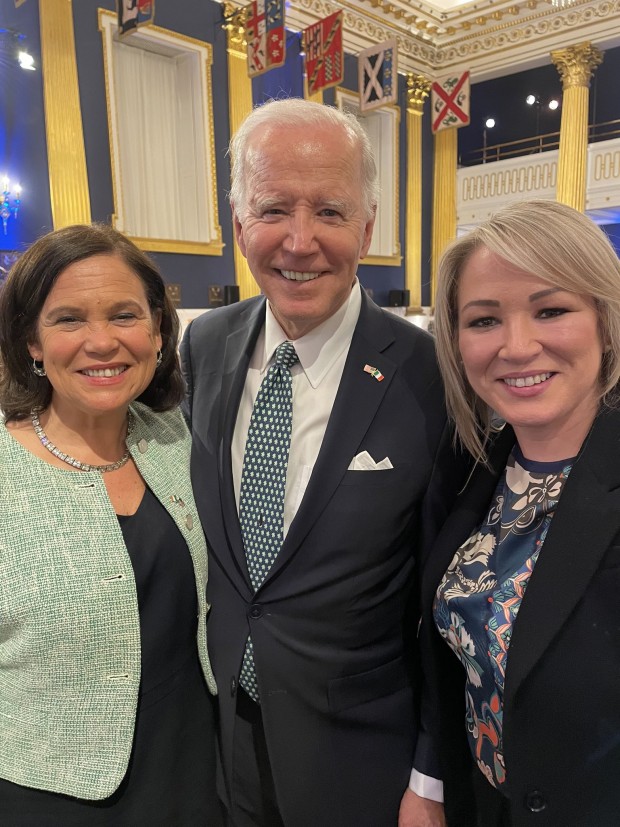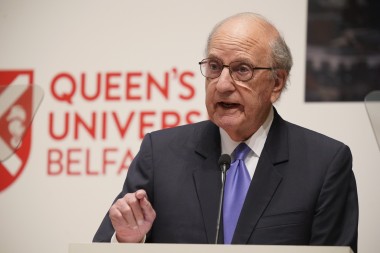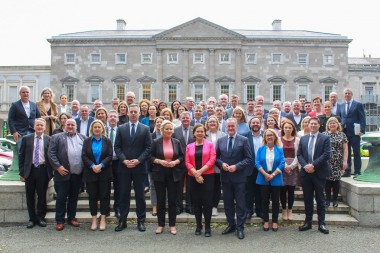25 April 2023
GFA anniversary underlines international significance of Ireland’s peace process
by Declan Kearney

Last week brought centre stage the historic role of both the US and EU in helping bring the peace process to this point. In the time ahead they will have a critical role in guaranteeing international law and maintaining the democratic integrity of the GFA.
The visit to Ireland by President Joe Biden was highly significant. It refocused international attention on the 25th anniversary of the Good Friday Agreement (GFA), which occurred the day before his arrival in Belfast.
President Biden’s commitment to the Irish peace process, and the positive good will of his administration towards Ireland, in the midst of an already complex global landscape, is a demonstration of the enduring influence of what Conor O’Clery, in a great book, described as the ‘Greening of the White House’.
The Irish peace process would not exist today without the role which was played by Irish Americans helping to engage initially with Bill Clinton’s campaign, and then his Presidential administration, as far back as 1993.
Joe Biden was as committed to peace in Ireland then as he is today.

That’s why his administration has authorised during the last two years the most sustained phase of diplomatic and political intervention with the political process in the north since the 1990s, with the active support of among others Richie Neal, Nancy Pelosi and Brendan Boyle.
Some of the most senior officials from the State Department, and on behalf of the White House, have been deployed.
President Biden’s visit was the outworking of all that. His message was very clear; power sharing needs to be restored; the British and Irish governments must be fully engaged together as co-guarantors of the GFA; and if this happens, new economic opportunities beckon.
His trip foreshadowed the Queen’s University, Belfast, Agreement 25 conference which occurred days after the President left.
This event was a remarkable success and testament to the collective leadership of Chancellor Hillary Clinton, Ian Greer, Richard English, Ryan Feeney, and other university staff.
Former President Bill Clinton, former and current Irish Taoisigh, British Prime Ministers, and other architects of the GFA including Gerry Adams, Reg Empey, Mark Durkan, John Alderdice, Monica McWilliams, Gary McMichael, and many others participated.
It put a strategic and political lens on the history of the GFA, and most importantly, looked forward.
The essential role of the EU was given its place. European Commission President Ursula Von der Leyen received a standing ovation when she spoke on Wednesday – making clear that the EU would remain fully involved with the peace process.
But it was Senator George Mitchell who set the tone for the conference with a tour de force speech. He looked towards the future with inimitable wisdom and clarity. His words were a master class in spoken diplomacy, and a clear illustration why he was the keystone for the achievement of the GFA 25 years ago.

This conference inspired hope and optimism, and a conviction in what is yet possible for the future.
That is where our collective focus must now turn.
The political requirements were reasserted throughout.
The ongoing blockage of power sharing is unsustainable. The Executive, Assembly and north/south political institutions must be reestablished immediately. The negotiations on the Protocol will not be reopened.
It brought into sharp relief the extent to which the DUP is absolutely out of line with domestic and international opinion. But it also opened a door for that party to join the democratic consensus.
The DUP is now at a crossroads. Its political isolation is complete, and it has to decide whether to finally abandon the politics of veto, and instead fully embrace the principles of the GFA.
It has a choice to make, but there is only one right decision.
The DUP has no alternative other than to adapt to all the new realities, many as direct consequences of Brexit.
Sinn Féin is the largest party in the north and will lead the power sharing coalition when the Executive is restored.
The democratic result of the May 2022 election must be respected, and the same will be required for the results of the local government election on 18 May.
The fact is that Sinn Féin is now the biggest party on the island of Ireland and will lead a government in Dublin at some stage in the future.

President Biden will remain in the White House for at least another 18 months. He intends to stand again.
If the opinion polls are correct, the Tories will not lead the next British government.
The momentum for independence Scotland continues.
The support of the EU for the north of Ireland and the GFA has been reinforced, not reduced. That will not be changing.
Other longstanding friends of, and stakeholders in the Irish peace process such as the Canadian and South African governments remain fully committed.
Everything has changed for political unionism. It no longer has an electoral majority in the north. And there will be even more electoral and political realignment after the 18 May council elections.
Irish unity is on the political horizon, but constitutional change will only come about as a consequence of democratic persuasion, and Sinn Féin is committed to that.
We believe that a united Ireland achieved through self-determination and peaceful transition, within the terms of the GFA, and full membership of the EU, will be best for all our people – and much better than rule by English politicians.
But change needs to be managed. The DUP should finally become partners in managing that change.
Unionists have much to gain. They will have greater influence in the context of constitutional transition than under the present status quo.
The British identity, unionist tradition and orange culture will have more guarantees within a new Irish national democracy than under current arrangements with English politicians of whatever stripe.
After 25 years of progress, we are not going backwards.
We may never agree about the past, but we can try to agree about the future.
So, this is exactly the right moment to open up the next phase of the peace process.
The Rubicon has been crossed. The only constant now will be even more change – democratic, political and constitutional change.
The GFA is our north star.
It provides a means to self-determination. Any notion of trying to interfere with that provision is irresponsible.
Attempts to subvert the principle of consent enshrined in the GFA with suggestions of new constitutional guarantees and amendments to the 1998 Act will be unacceptable. That will only serve to further deepen the existing crisis.
If the DUP needs a little more time to pull itself out of its self-inflicted abyss, that is open to reasonable consideration.
What is not an option will be any revision to the legislative basis of the GFA, or the framework of universal rights and principles upon which it was built.
The GFA is an international treaty; that, and its basis in law are immutable.
But time is running out.
People are suffering because of the cost-of-living crisis. Public services in the north are at breaking point. The health service is on its knees.
In the absence of an Executive the Tories are proposing to impose a budget in the north which senior civil servants both past and present are forecasting will cause irreparable damage.
So the DUP needs to make its mind up… and fast.
If it continues to refuse to accept the new democratic realities, realise that the northern state has been irreversibly transformed, and embrace the challenge of moving to the next stage of the peace process, then the British and Irish governments must agree a new political framework for overseeing the north, with continued support of both the US administration and EU.
Last week brought centre stage the historic role of both the US and EU in helping bring the peace process to this point. In the time ahead they will have a critical role in guaranteeing international law and maintaining the democratic integrity of the GFA.
The peace process and managing future constitutional change in Ireland will continue to rely upon their, and other international partners’ strategic support and goodwill.
Follow us on Facebook
An Phoblacht on Twitter
Uncomfortable Conversations

An initiative for dialogue
for reconciliation
— — — — — — —
Contributions from key figures in the churches, academia and wider civic society as well as senior republican figures





